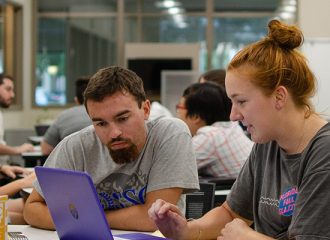By Joshua Paul Estabalaya
There is as much diversity in college degree programs as there is in any other facet of a university, and there’s also great diversity in the motivations students have for pursuing their respective degrees. Given that our modern society gets much of its complexity from this richness in expertise and vocation, it’s important to acknowledge and appreciate the fact that students go to college and choose majors for a multitude of reasons.
This appreciation was something I did not possess at first. When I started my university journey, I didn’t recognize the richness in my peers’ educational paths and motivations. This lack of recognition was reflected in my sole resolve to pursue my original degree program: Materials Engineering. At the start of college, I largely saw university majors as the key to a high-paying, secure job and nothing else. I signed up for Materials Engineering since the field was exactly that, high-paying and secure.
It was a fair degree to go for, but a nasty side effect of this view of mine—money—was that I failed to see, and more importantly, appreciate the value of other educational paths. I perceived some degrees, such as philosophy and history, as fruitless and “dead-end.” I couldn’t imagine putting so much effort into a program whose reward I couldn’t see at the time.
But my perspective has since changed. I’ve come to appreciate how diverse students’ degree motivations are. The change started with a conversation I had with a guest speaker at the Philosophy Society RSO—despite seeing the philosophy degree as “dead-end” at the time, I still had an interest in it.
While we were talking, he eventually asked what major I was taking and why. I, of course, said Materials Engineering, with the reason being that it would be a ticket to a high-paying, secure job. Although he didn’t completely dislike my response, it did seem to disappoint him.
“That’s your only reason for majoring in Materials Engineering?” he asked. “Have you thought of other reasons for why you want to pursue that degree?”
At the time, I hadn’t. Job security and financial stability were the only two concerns directing me to the Materials Engineering program. Beyond that, I had no other motivations to pursue it.
“You seem to care only about one of those motivations: money,” he said. He warned that such an insular attitude doesn’t appreciate the diverse scope of reasons why people go to university and use the education obtained from it to start a career.
The guest speaker wasn’t all that happy with this. Seeing that money was the only motivation I had for going for my major, he went up to the computer at the front desk of our room, opened Google, and brought up an article on Ikigai. Ikigai is a Japanese concept that gives various reasons for why people do what they do. He then explained that these reasons Ikigai lists—passions, capabilities, money, societal needs—also motivate college students to pursue the majors they pursue. “You seem to care only about one of those motivations: money,” he said. He warned that such an insular attitude doesn’t appreciate the diverse scope of reasons why people go to university and use the education obtained from it to start a career.
Our conversation ended there. Afterward, once the Philosophy Society meeting had concluded, I reflected on this caution the guest speaker had made. While it had long been unapparent to me, I began to realize that money and job security were the only things that made me judge the worthwhileness of degree programs. While there was nothing wrong with pursuing engineering, my reasons behind it were skewed: I cared only about whether the degree got me a good salary after college, and whether I could compete in the job field. I gave no thought to whether the job would be self-actualizing, whether it would be something I cared for, or if I could use it to contribute meaningfully to society.
This realization floated in my head for the rest of the Spring 2024 semester. I started to reconsider those degrees that I was so dismissive of. Were they really “dead-end”?
I also talked to myriad students who were pursuing a diverse range of degrees: film studies, psychology, literature, history, and writing, and these students gave justifications for their academic journeys that were just as strong as mine—some stronger. One student wanted to contribute to making the entertainment industry better; another wanted to give a voice to marginalized people often overlooked in mainstream history narratives. I was becoming aware of the diverse desires prompting my fellow students to pursue their degrees and was inspired. I began seeing the diversity of educational paths being taken at UCF with a more open perspective.
There is indeed value in the richness of our unique university journeys. In my conversation with that guest speaker from Philosophy Society, he said that despite Gender Studies being hounded for being a supposedly useless, perhaps “dead-end,” major, its knowledge is highly valuable. “Do we not need people aware of gender inequalities in our society and how to fix them?” he asked. Even degree programs that students go for less often and appear not worthwhile add value to our communities, both within the university and outside it.
What this all came to, then, was a new reckoning about college and why I was here. It was clear to me that my fellow peers were going for diverse degrees for a variety of reasons, and that the vast majority of these reasons are well thought out, impassioned, and fruitful. And so, this “dead-end degrees” idea–an idea that had been keeping me from exploring my own passions–seemed wrong to me. Eventually, it fizzled out of my mind.
During the last weeks of the Spring 2024 semester, I talked to a host of professors and advisors on majors I was interested in: history, writing, journalism, and legal studies. Eventually, I settled on journalism, encouraged by my passion for writing and curiosity in the media. That is what my current major is, in fact—I switched to it from Materials Engineering at the start of the summer semester.
With this new educational path set before me, I also have a new, deep appreciation for the diversity of students’ educational motivations, evidenced by my conversation with the guest speaker, students, professors, and advisors. Without them, I would still be thinking that degrees’ worth comes from mere salaries and job security. Now, I see that a society diverse in occupations and vocations stems from diversity in educational motivation. In celebrating our collective diversity here at UCF, let’s appreciate an important form in which diversity takes place on campus: our educational paths and aspirations.





